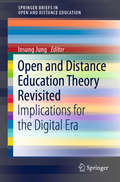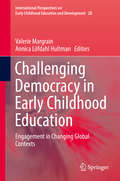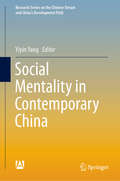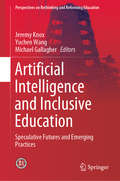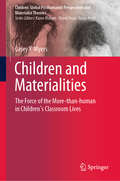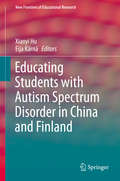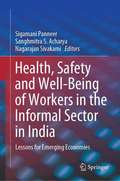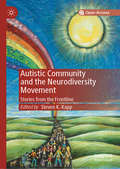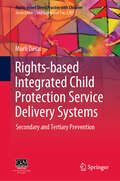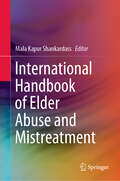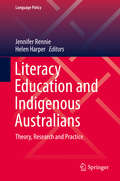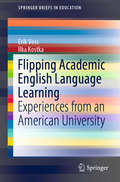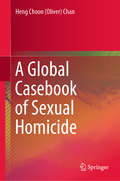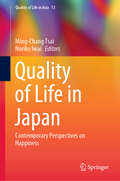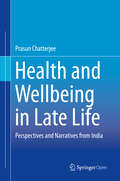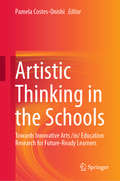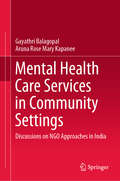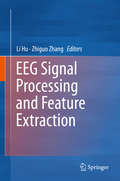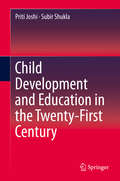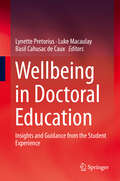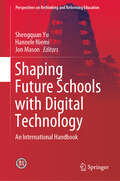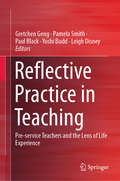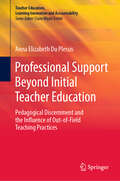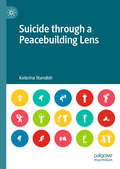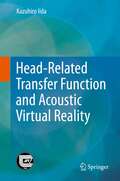- Table View
- List View
Open and Distance Education Theory Revisited: Implications for the Digital Era (SpringerBriefs in Education)
by Insung JungThis book explores foundational theories that have been applied in open and distance education (ODE) research and refined to reflect advances in research and practice. In addition, it develops new theories emerging from recent developments in ODE. The book provides a unique and up-to-date source of information for ODE scholars and graduate students, enabling them to make sense of essential theory, research and practice in their field, and to comprehend the gaps in, and need for further enquiry into, theoretical approaches in the digital era. It also offers theory-based advice and guidelines for practitioners, helping them make and justify decisions and actions concerning the development, implementation, research and evaluation of ODE.
Challenging Democracy in Early Childhood Education: Engagement in Changing Global Contexts (International Perspectives on Early Childhood Education and Development #28)
by Valerie Margrain Annica Löfdahl HultmanThis book explores how concepts and values of contemporary democracy are variously understood and applied in diverse cultural contexts, with a focus on children and childhood and diversity. Drawing on a range of methodological approaches relevant to early childhood education, it discusses young children's engagement and voice. The book identifies existing practices, strengths, theories and considerations in democracy in early childhood education and childhood, highlighting the democratic participation of children in cultural contexts. Further, it illustrates how democracy can be evident in early childhood practices and interactions across a range of curriculum contexts and perspectives, and considers ways of advancing and sustaining practices with positive transformational opportunities to benefit children and wider ecological systems.It offers readers insights into what democracy and citizenship look like in lived experience, and the issues affecting practice and encouraging reflection and advocacy.
Social Mentality in Contemporary China (Research Series on the Chinese Dream and China’s Development Path)
by Yiyin YangThis book not only seeks to theoretically analyze the concept, chief characteristics and framework of “social mentality”, but also explores the influence of social mentality on such elements of social functioning as individuals, groups, societies, markets and countries, and the influence of such elements as cultural, social, economic, political and mental factors on social mentality. Besides, this book discusses the structure of social mentality, tools for measuring it, and an indicator system. What’s more, it explores the role of the social mentality mechanism in the construction of harmonious societies.
Artificial Intelligence and Inclusive Education: Speculative Futures and Emerging Practices (Perspectives on Rethinking and Reforming Education)
by Jeremy Knox Yuchen Wang Michael GallagherThis book brings together the fields of artificial intelligence (often known as A.I.) and inclusive education in order to speculate on the future of teaching and learning in increasingly diverse social, cultural, emotional, and linguistic educational contexts. This book addresses a pressing need to understand how future educational practices can promote equity and equality, while at the same time adopting A.I. systems that are oriented towards automation, standardisation and efficiency. The contributions in this edited volume appeal to scholars and students with an interest in forming a critical understanding of the development of A.I. for education, as well as an interest in how the processes of inclusive education might be shaped by future technologies. Grounded in theoretical engagement, establishing key challenges for future practice, and outlining the latest research, this book offers a comprehensive overview of the complex issues arising from the convergence of A.I. technologies and the necessity of developing inclusive teaching and learning.To date, there has been little in the way of direct association between research and practice in these domains: A.I. has been a predominantly technical field of research and development, and while intelligent computer systems and ‘smart’ software are being increasingly applied in many areas of industry, economics, social life, and education itself, a specific engagement with the agenda of inclusion appears lacking. Although such technology offers exciting possibilities for education, including software that is designed to ‘personalise’ learning or adapt to learner behaviours, these developments are accompanied by growing concerns about the in-built biases involved in machine learning techniques driven by ‘big data’.
Children and Materialities: The Force of the More-than-human in Children’s Classroom Lives (Children: Global Posthumanist Perspectives and Materialist Theories)
by Casey Y. MyersThis book makes the case for young children as both keenly materially aware of and highly dependent on sets of interrelated material-discursive circumstances. It argues that long-term engagement with children around the topic of meaning-matter relations upends many taken-for-granted notions of consumption, self-regulation, knowledge production, and what constitutes quality of life within a school setting.The book provides complex accounts of agency on multiple scales - the capability of children to shape and share research, the force of objects, stuff, and things to impact the "social" workings of a classroom, and the impact of nonhuman animals on the trajectory of the ways in which children relate to each other.This work makes a significant contribution to both theoretical conceptions and practical enactments of childhoods, productively addressing the many contradictions inherent in a posthuman and participatory approach to researching with young children. It also offers insights into how the everyday materialities of children’s classrooms (and their complex representations) are capable of disrupting the common-sense order of things.
Educating Students with Autism Spectrum Disorder in China and Finland (New Frontiers of Educational Research)
by Xiaoyi Hu Eija KärnäThis book addresses the difficult challenges that children with autism present educators. By comprehensively examining the scientific knowledge underlying educational practices, programs and strategies in China and Finland, it provides valuable information for parents, administrators, researchers, and policy makers. This book examines the following fundamental issues related to the education of children with autism: •How children's specific diagnoses should affect educational assessment and planning •How we can support the families of children with autism •Features of effective instructional and comprehensive programs and strategies •How we can better prepare teachers, school staff, professionals and parents when it comes to educating children with autism •What policies at the national and local levels will best ensure appropriate education, examining strategies and resources needed to address the rights of children with autism to appropriate education
Health, Safety and Well-Being of Workers in the Informal Sector in India: Lessons for Emerging Economies
by Sanghmitra S. Acharya Sigamani Panneer Nagarajan SivakamiThis book focuses on the core problems of occupational health, safety and well-being of workers in the informal sector in developing countries, where it accounts for most of the rural labour force and a substantial percentage of the urban labour force. The sector is characterised by low incomes, unstable employment and lack of protection in the form of legislation/policies or trade unions. Though some health and problem-solving measures have been introduced, a focused academic effort to address the problems confronting workers in the unorganised sector, or informal economy, is lacking.The book evaluates workers’ physical and mental health in the context of labour migration, social inclusion of minorities and the differently abled, provisions for women workers, demonetisation, occupational safety for hazardous work, and in connection with various areas of informal work, e.g. agriculture, construction, transportation, sanitation, tanning, the tobacco industry, powerloom industry, surrogacy, and self-employment. It provides a well-rounded description of an analytical reflection on the challenges these workers face and focuses on social policy changes to help alleviate them. Accordingly, it offers a valuable asset for researchers and students interested in development studies, the sociology of work, health and labour economics, public health, and social work.
Autistic Community and the Neurodiversity Movement: Stories from the Frontline
by Steven K. KappThis open access book marks the first historical overview of the autism rights branch of the neurodiversity movement, describing the activities and rationales of key leaders in their own words since it organized into a unique community in 1992. Sandwiched by editorial chapters that include critical analysis, the book contains 19 chapters by 21 authors about the forming of the autistic community and neurodiversity movement, progress in their influence on the broader autism community and field, and their possible threshold of the advocacy establishment. The actions covered are legendary in the autistic community, including manifestos such as “Don’t Mourn for Us”, mailing lists, websites or webpages, conferences, issue campaigns, academic project and journal, a book, and advisory roles. These actions have shifted the landscape toward viewing autism in social terms of human rights and identity to accept, rather than as a medical collection of deficits and symptoms to cure.
Rights-based Integrated Child Protection Service Delivery Systems: Secondary and Tertiary Prevention (Rights-based Direct Practice with Children)
by Murli DesaiThe Sourcebook-IV provides training modules for rights-based integrated child protection service delivery systems at the secondary and tertiary prevention levels. Part 1 of the Sourcebook focuses on the preventative, comprehensive, integrated and systemic, and universal community-based and family-based service delivery systems for children; and the methods of case management and outcomes-based project cycle. Part 2 discusses children and families at risk and the role of community-based Integrated Childcare and Support Centres for providing supplementary care and support services to them at the secondary prevention level. It also focuses on children facing sociolegal problems such as deprivation of parental care, violence, and conflict with law, and the role of District-based Integrated Child Protection Centres for providing protection, justice and rehabilitation to them at the tertiary prevention level. Part 3 focuses on children in emergencies in general and in specific situations and role of Integrated Child Protection Centres in these situations. This is a necessary read for social workers, lawyers, researchers, trainers and teachers working on child rights across the world, and especially in developing countries.
International Handbook of Elder Abuse and Mistreatment
by Mala Kapur ShankardassThis first-of-its-kind work on elder abuse and mistreatment provides a comprehensive and up-to-date overview of the subject. Covering almost all regions of the world, it highlights different dimensions of elder abuse and mistreatment in terms of their prevalence, incidence, prevention, treatment, management and response from governments and civil society, academic and research communities, and society in general. Written by international specialists from various disciplinary and presenting the latest findings and data, the handbook includes sections on the Americas; the Caribbean; Europe; Central, West and South Asia; East Asia and Asia-Pacific; and Africa. The chapters offer clarity on the concept and forms of elder abuse and neglect, discuss research methodology, and provide policy options, legislative solutions and programmatic responses to give relief to older people as victims of abuse and neglect as well as to deal with the perpetrators. This book is intended for a wide range of students and researchers interested in aging, from sociology, to social work, community medicine, public health, clinical psychology, and human rights/law.
Literacy Education and Indigenous Australians: Theory, Research and Practice (Language Policy #19)
by Jennifer Rennie Helen HarperThis edited volume brings together diverse perspectives on Australian literacy education for Indigenous peoples, highlighting numerous educational approaches, ideologies and aspirations. The Australian Indigenous context presents unique challenges for educators working across the continent in settings ranging from urban to remote, and with various social and language groups. Accordingly, one of the book’s main goals is to foster dialogue between researchers and practitioners working in these contexts, and who have vastly different theoretical and ideological perspectives. It offers a valuable resource for academics and teachers of Indigenous students who are interested in literacy-focused research, and complements scholarship on literacy education in comparable Indigenous settings internationally.
Flipping Academic English Language Learning: Experiences from an American University (SpringerBriefs in Education)
by Erik Voss Ilka KostkaThis book draws on theory, research, and practice-oriented literature to offer an introduction to flipped learning and offer busy instructors advice on how to flip their academic English language courses. The chapters balance theoretical foundations, practical applications, and useful resources for developing materials. The first half of this book defines flipped learning and academic English, describes how it supports English language learning, and explains the role of technology, as well as issues with accountability and feedback. The second half of the book then makes connections between the theoretical issues presented in the first three chapters and the practical applications in the following chapters, which provide lesson descriptions and assessment ideas for language learning contexts with or without access to technology. The book concludes with a list of tools and technologies for developing materials and activities, as well as additional resources for professional development and further exploration of flipped English language learning.
A Global Casebook of Sexual Homicide
by Heng Choon ChanThis book comprehensively discusses 13 infamous cases of serial and non-serial sexual homicide committed around the globe in the past four decades (1974–2010). Offering a psycho-criminological perspective, it analyzes the cases theoretically (i.e., contributing and precipitating factors, and offender typology) and considers the practical implications (i.e., investigative and crime-preventive measures, and social services). The first book to offer a glimpse of this topic from a global perspective, it adopts a unique approach—case background and critical analysis. As such it is a valuable source of reference for scholars, clinicians, and law enforcement practitioners wanting to gain a better understanding of this type of violent offender.
Quality of Life in Japan: Contemporary Perspectives on Happiness (Quality of Life in Asia #13)
by Ming-Chang Tsai Noriko IwaiThis edited volume approaches the life experiences and well-being of Japanese people from an empirical perspective. It explores the current trend of happiness among Japanese over time and examines the association of income, lifestyle, and perceived life conditions using modern econometric models with supplementary qualitative observations. Issues relating to ageing, gender, household division of labour, and emigration are also examined to provide a wide scope of results based on both survey and field methods for culturally sensitive researchers. Going beyond the conventional cultural interpretation of the uniqueness of the Japanese case, this book provides timely, empirical evidence for understanding how the various social groups comprising the Japanese population have enjoyed a better quality of life, while some groups are very dissatisfied with social arrangements and have elected to emigrate. The book is a pioneering endeavour to reveal the detailed structure of quality of life and well-being in Japanese society.
Health and Wellbeing in Late Life: Perspectives and Narratives from India
by Prasun ChatterjeeThis open access book takes a multidisciplinary approach to provide a holistic understanding of late old age, and situates the aged person within the context of family, caregivers, clinical and other institutions. All through the book, the author discusses preparedness for an aging individual as well as the society in the Indian context. The book highlights inevitable but mostly neglected health issues like depression, dementia, fall, and frailty and provides detailed analyses of solutions that are practicable in low resource settings. It also brings up intergenerational differences and harmony in the context of holistic care of older Indians. Alongside clinical perspectives, the book uses narratives of elderly patients to dwell on the myriad of problems and issues that constitute old age healthcare. Demonstrating cases that range from the most influential to the most underprivileged elderly in India, the book enlightens multiple caregivers—doctors, nurses, and professional caregivers as well as family members—about the dynamic approach required in dealing with complex issues related to late old age. The narratives make the book relatable and interesting to non-academic readers, with important lessons for gerontological and geriatric caregiving. It is also of use to older adults in preparing for active aging.
Artistic Thinking in the Schools: Towards Innovative Arts /in/ Education Research for Future-Ready Learners
by Pamela Costes-OnishiThis book examines current context-specific trends and developments in empirical research on arts education and arts in education, in order to evaluate and create responsive approaches to future global challenges. By highlighting the centrality of the arts in advancing future orientations in education, it offers a timely and valuable contribution to educational issues on preparing teachers and learners for the increasingly complex societal dynamics and unpredictable global economy.
Mental Health Care Services in Community Settings: Discussions on NGO Approaches in India
by Gayathri Balagopal Aruna Rose KapaneeThis book discusses approaches used by NGOs in formulating and implementing mental health care in the community in the context of high treatment gap, insufficient public expenditure on health, human resource shortages, heterogeneity of communities as well as cultural beliefs in India. It uses a qualitative case study approach to document and analyse the work of some major NGO-run community mental health programmes in India, all of which cater to vulnerable populations and are in different and diverse regional settings. It casts the spotlight on envisioning community mental health in policy and law, implementation by the government, how it is practised by select NGOs and the challenges involved in programme implementation. In doing so, it hopes to understand the trigger factors that have led to NGOs embarking on community mental health programmes: how needs of the community are understood, the funding mechanisms, how the human resource gap was addressed, type of networks formed in the community, therapeutic and social interventions, accountability mechanisms, achievements and limitations of the programmes. This book is for students and researchers in the fields of social work and psychology, and NGOs, government and funding agencies, and for those interested in understanding and working with community mental health programmes.
EEG Signal Processing and Feature Extraction
by Li Hu Zhiguo ZhangThis book presents the conceptual and mathematical basis and the implementation of both electroencephalogram (EEG) and EEG signal processing in a comprehensive, simple, and easy-to-understand manner. EEG records the electrical activity generated by the firing of neurons within human brain at the scalp. They are widely used in clinical neuroscience, psychology, and neural engineering, and a series of EEG signal-processing techniques have been developed. Intended for cognitive neuroscientists, psychologists and other interested readers, the book discusses a range of current mainstream EEG signal-processing and feature-extraction techniques in depth, and includes chapters on the principles and implementation strategies.
Child Development and Education in the Twenty-First Century
by Priti Joshi Subir ShuklaThis book provides an in-depth understanding of how children’s development at different stages of their lives interfaces with the kind of education and support they need at school and home. It examines closely how education, in turn, influences their development and prepares them for an uncertain future. The chapters focus on the rapid developments of the 21st century that are changing the nature of education, especially the shift needed to being able to sift through and meaningfully deal with overwhelming volumes of information now available. This book helps readers understand how children can benefit from the digital environment while avoiding its pitfalls. Keeping in mind that in today’s world parents are getting to spend less time with their children, the authors provide research-backed ideas on how they can best enable children’s development, including their thoughts, feelings and notions of self. Given the increasing disparities, there is a perceptive analysis of how education can build an awareness of equity in a context marked by diversity and disadvantage. This book addresses issues such as these in a reliable, scholarly yet accessible manner, for students, young researchers and lay readers. Consequently, it is a valuable source of fundamental insights and understanding for educators, policy-makers, educational administrators and students of human and child development, education, and teacher training courses.
Wellbeing in Doctoral Education: Insights and Guidance from the Student Experience
by Lynette Pretorius Luke Macaulay Basil Cahusac de CauxThis book offers a range of personal and engaging stories that highlight the diverse voices of doctoral students as they explore their own learning journeys. Through these stories, doctoral students call for an academic environment in which the discipline-specific knowledge gained during their PhD is developed in concert with the skills needed to maintain personal wellbeing, purposely reflect on experiences, and build intercultural competence. In recent years, wellbeing has been increasingly recognised as an important aspect of doctoral education. Yet, few resources exist to help those who support doctoral students. Wellbeing in Doctoral Education provides a voice for doctoral students to advocate for improvements to their own educational environment. Both the struggles and the strategies for success highlighted by the students are, therefore, invaluable not only for the students themselves, but also their families, their social networks, and academia more broadly. Importantly, the doctoral students’ stories should be a clarion call for those in decision-making positions in academia. These narratives demonstrate that it is imperative that academic institutions invest in providing the skills and support that doctoral students need to succeed academically and flourish emotionally.
Shaping Future Schools with Digital Technology: An International Handbook (Perspectives on Rethinking and Reforming Education)
by Shengquan Yu Hannele Niemi Jon MasonThis book presents an overview of education technology and its use in schools, with a primary emphasis on best practices of technology enhanced learning; how new technologies such as mobile, augmented and wearable technologies affect instructional design strategies; and the content curriculum development process. Providing insights into the future of education and the upcoming pedagogies that will be applied in schools, it helps educators and other stakeholders make innovations for the new generations of learners in the 21st century.The use of emerging technologies such as mobile and ubiquitous technologies, context-aware technology, augment-reality, and virtual reality is contributing to making education adaptive and smarter. With the ever-changing technologies, how to equip teachers with these digital skills and transform their teaching style is also important to ensure that school education is more individualised and customised for students.Offering a global perspective with integrated practical cases, this timely book is of interest to educators, teachers, and education policymakers. And although most of the authors are from the academia, it provides non-experts with a novel view of what future schools will be like with the help of technology.
Reflective Practice in Teaching: Pre-service Teachers and the Lens of Life Experience (Reflective Teaching Ser.)
by Gretchen Geng Pamela Smith Paul Black Yoshi Budd Leigh DisneyThis book investigates the ways in which pre-service teachers develop and articulate their professional knowledge by presenting their reflections on contemporary issues and topics they have explored during their own teaching practicums. It uses reflective practice to connect pre-service teachers’ personal backgrounds with their placement experience concerning a self-selected topic, including teacher educators’ reflections on the pre-service teachers’ reports on these placement topics. By illustrating the broad range of issues encountered by pre-service teachers, sharing multiple perspectives on the complexity of classroom practice, and demonstrating the importance of reflective practice, it also provides a valuable mentoring framework. Moreover, the book studies how examining pre-service teachers’ life experience can facilitate in-depth understanding, specifically in the context of pre-service teachers’ reflections on their own practices in different educational settings. In short, the book helps current and prospective pre-service teachers and teacher educators get to know their students and themselves better using reflective practice.
Professional Support Beyond Initial Teacher Education: Pedagogical Discernment and the Influence of Out-of-Field Teaching Practices (Teacher Education, Learning Innovation and Accountability)
by Anna Elizabeth Du PlessisThis book investigates the professional learning needs of teachers beyond initial teacher education, focusing on teachers in complex teaching positions, such as out-of-field teaching practices. The information presented here will help to improve professional learning strategies, while also offering an in-depth understanding of teachers’ needs, leaders’ perceptions, and what complex teaching situations mean for teachers’ professional learning and development. Further, Du Plessis shares the perceptions and lived experiences of teachers, parents, leaders and students as key stakeholders in quality teaching and learning environments.In light of new evidence-informed findings on the out-of-field phenomenon and continuing professional learning, Du Plessis puts forward strategies that will enhance the effectiveness of professional learning and development programs, while also fostering improved decision-making and policy development. In brief, Du Plessis focuses on the impact that complex teaching situations have on teachers’ unique needs, the support that is provided, and the influence of the out-of-field phenomenon on teachers’ responses to continuing professional learning and development programs.
Suicide through a Peacebuilding Lens
by Katerina StandishThis book, as the first exploration of suicide in Peace and Conflict Studies (PACS), illustrates the scarcity of suicide research in the discipline and argues that the leading cause of violent death worldwide is a multifaceted phenomenon that needs to be fully comprehended as a significant and often preventable form of world-wide violence. The author supplies a theoretical framework for assessing suicide as medical or instrumental, posits interdisciplinary complementarity and offers future lines of inquiry that challenge established notions of prevention. The book presents a PACS meta-theory termed ‘encounter theory’ and supplies a suicidal peacebuilding platform via relationship. This book questions why more PACS scholars aren’t turning their attention to suicide when more people die by suicide than ethnic, religious or ‘terroristic’ violence combined.
Head-Related Transfer Function and Acoustic Virtual Reality
by Kazuhiro IidaThis book covers all aspects of head-related transfer function (HRTF), from the fundamentals through to the latest applications, such as 3D sound systems. An introductory chapter defines HRTF, describes the coordinate system used in the book, and presents the most recent research achievements in the field. HRTF and sound localization in the horizontal and median planes are then explained, followed by discussion of individual differences in HRTF, solutions to this individuality (personalization of HRTF), and methods of sound image control for an arbitrary 3D direction, encompassing both classic theory and state of the art data. The relations between HRTF and sound image distance and between HRTF and speech intelligibility are fully explored, and measurement and signal processing methods for HRTF are examined in depth. Here, supplementary material is provided to enable readers to measure and analyze HRTF by themselves. In addition, some typical HRTF databases are compared. The final two chapters are devoted to the principles and applications of acoustic virtual reality. This clearly written book will be ideal for all who wish to learn about HRTF and how to use it in their research.
